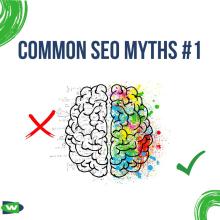
Myth: The more keywords, the better
Truth: Keyword stuffing can actually cause your SEO to suffer. A strategic list of targeted keywords used naturally throughout your content is best.
Overusing keywords, or simply just using too many keywords per page, is a common SEO mistake. Particularly for individuals who are new to the industry, it can be tempting to compile a long list of keywords or to optimize every sentence on a page. In reality, though, over-optimizing almost always involves awkward sentence structure and repetitive sounding content. When keywords are overused in this manner, the result is known as “keyword stuffing.”
Google and other search engines can easily identify when a website is using keyword stuffing methods. Since keyword stuffing leads to poor quality content that is not helpful to website users, websites using these methods will usually rank poorly or not at all on search engines.
Instead of overusing keywords, it’s best to compile a strategic list of highly relevant keywords for each optimized page on your site. Each list should focus on things like geolocation, target audience, and other targeted aspects. The number of keywords per page will vary depending on the type of business and the service area, but 3-6 keywords per page is standard. You may also find that it’s easier and more natural to include a more targeted keyword set into your content, titles, image descriptions, alt text, and more.
Myth: Using higher volume keywords leads to better website traffic
Truth: Higher volume keywords may be too broad or difficult to rank for. Best practices include a targeted list that considers relevancy, keyword difficulty, competition, and keyword volume.
If you're new to SEO, it might seem like using higher volume keywords will ultimately lead to better traffic. In actuality, this couldn't be farther from the truth. Considering high volume keywords also tend to have higher competition, the result of using only high volume keywords can be a bit like expecting to win a raffle that has too many entries. The odds of ranking well using only high volume keywords is significantly lower since the pool of others using the same keywords is so much larger than with a more targeted list.
A much better practice is considering multiple keyword factors in tandem with keyword volume. These factors include keyword relevancy, keyword modifiers, and keyword difficulty based on competition. Researching your keywords this way will give you a more well-rounded list and an accurate portrayal of what you can expect from their keyword efforts.
Furthermore, keywords that include modifiers such as geolocation, seasonal indicators, or other long tail keyword factors tend to result in lower volume keywords that appeal to a much more targeted audience. One example of this is a Denver pizzeria using the keyword “denver pizza,” which has a keyword volume of 1900, versus using the keyword “pizza” which has a keyword volume of 11 million. The keyword without the geo-modifier has a much higher volume, although it is much too broad for a Denver-based pizza restaurant.
Myth: More traffic equals more conversions
Truth: Traffic from your target audience leads to better conversions.
As strange as it sounds, increasing traffic is easy for any website. Improving quality traffic, however, involves a proper strategy. Getting more quality traffic consists of optimizing your website so that it is findable and visible to your target audience. The more your target audience can find your website, the higher your conversion rates will be!
Myth: That you can add a list of keywords to the “back end” of a website
Truth: There are many ways to use keywords across your site. However, there is no *ethical* way to simply list keywords in your website.
The myth that you can simply add a list of keywords to the backend of a website most likely stemmed from the early ages of the Internet when methods such as meta-keywords and keyword stuffing were both common and acceptable forms of SEO. This is no longer the case. Search engines have since realized that some of the old SEO techniques caused poor-quality websites to show higher in search results.
Nowadays, applied SEO methods include using keywords for quality content, image descriptions, meta-data, titles, page labels, and even alt text that are much more effective and helpful for the end user. Additionally, other non-keyword-related factors that improve a website visitor’s experience such as page speed, accessibility, user experience, and core web vitals all contribute to positive SEO.
Myth: All SEO companies are the same
Truth: The quality of SEO companies varies as much as anything else!
Choosing an SEO company is similar to choosing anything else. Just like deciding on a restaurant, a pair of shoes, or a car, quality matters when it comes to SEO services.
At Denverdata Web, we believe that we only succeed when our customers succeed! Our ambitious and experienced SEO experts will work to build custom SEO strategies specifically tailored to meet and exceed your business goals. Reach out to our Colorado SEO team today to ask about our search engine optimization services!
